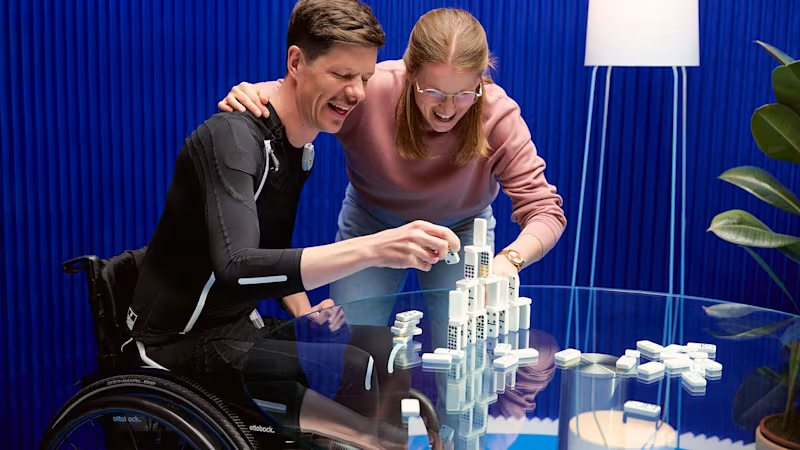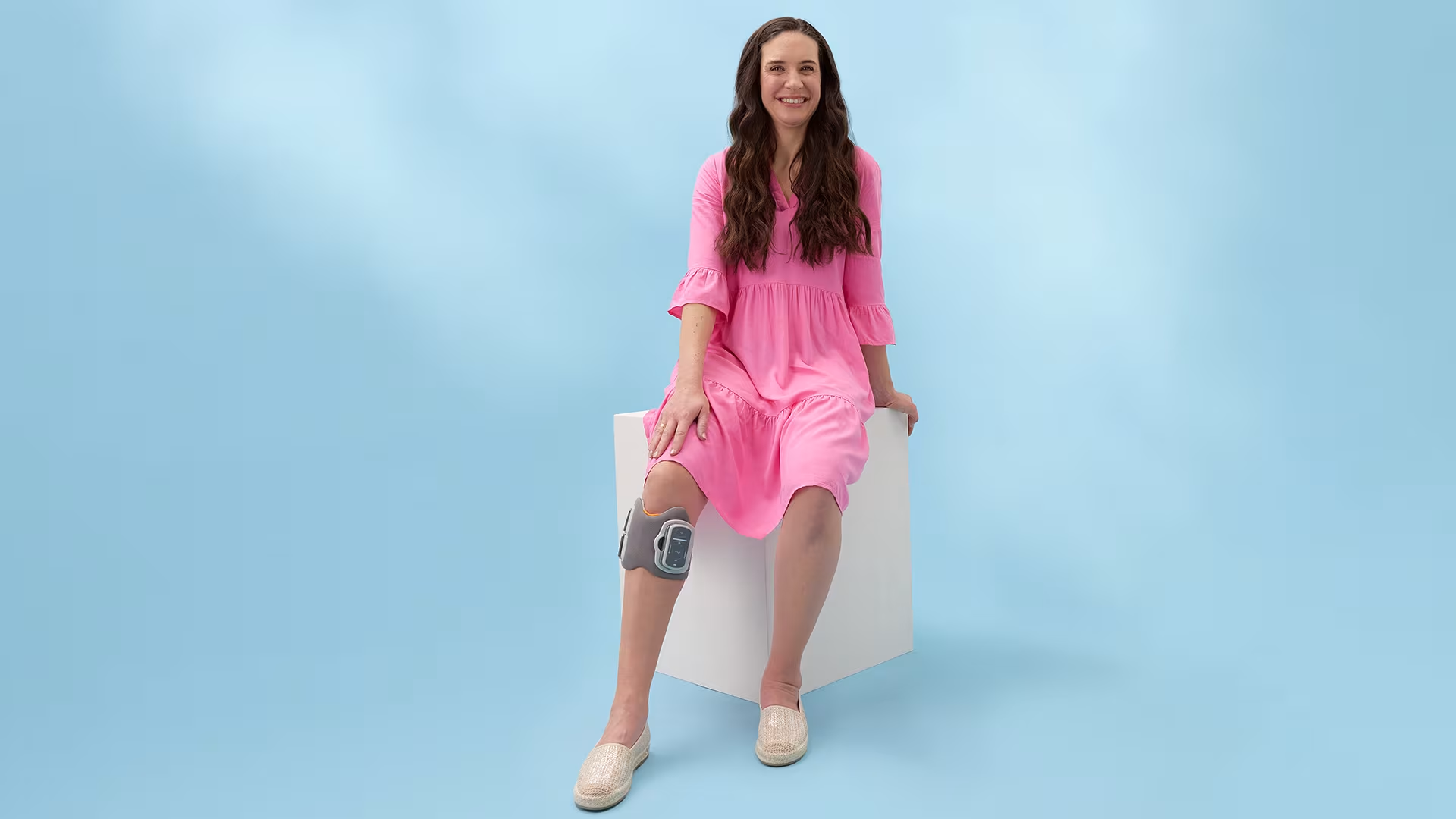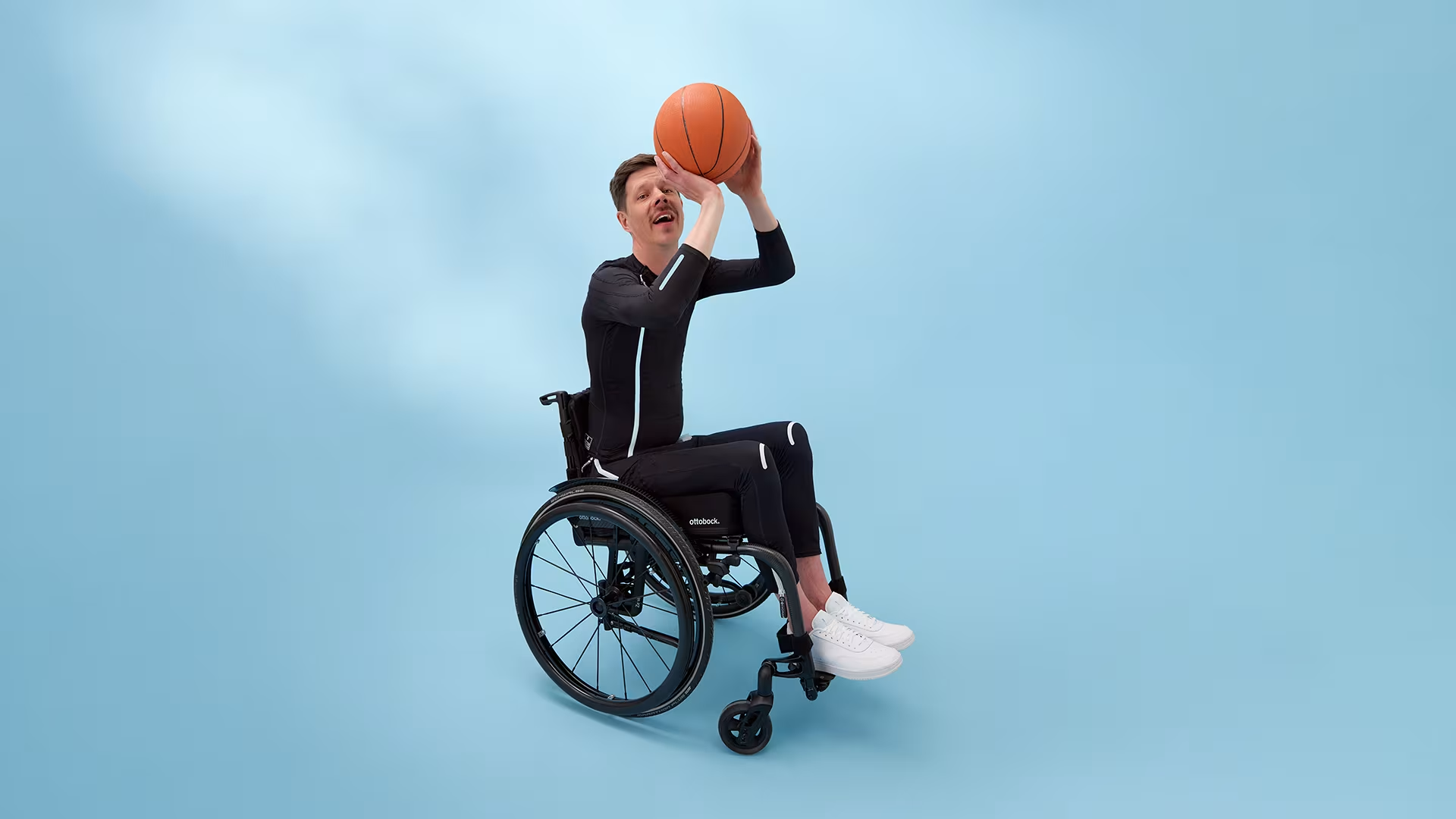Multiple sclerosis (MS)

A lifelong journey with many different paths.
Multiple Sclerosis (MS) is a neurological condition that affects the brain, spinal cord, and/or optic nerves. If you or a loved one is living with this condition, you may have already discovered how complex and unpredictable it can be. Everyone’s experience with MS is unique.
Multiple sclerosis causes a variety of symptoms that can have a challenging impact on your daily life, from family activities, to work, to favourite hobbies, and more. It can also cause mobility challenges like muscle weakness, pain, and spasticity – symptoms that can make it harder to move around your home, community, or other spaces that are important for you [1,2].
Keep reading to learn more about life with MS, how it’s diagnosed and managed, and how the right mobility solutions can help people living with MS stay active and healthy.
2.8 million
people worldwide are currently living with MS [2]
300
people around the world are diagnosed with MS every day [3]
#1
non-traumatic cause of neurological disability in young adults [4]
2X
more common in females than males [5]
75%
of people living with MS are female [6]
20-40
is the average age of initial diagnosis [7]
What causes Multiple Sclerosis?
MS symptoms occur when the immune system attacks the central nervous system and damages a protective sheath called “myelin” that covers nerves cells. Myelin plays an important role in conducting nerve signals. When damaged, it affects the central nervous system’s ability to communicate with and control your body.
No one knows exactly what triggers these attacks, but environmental or genetic factors may play a role [1,2]. Some research suggests MS may occur when someone with a certain set of genes is exposed to specific environmental factors. Other studies also point to ethnicity and geography potentially playing a role in who develops MS [1].
MS typically affects younger people, especially women. In fact, the average age of diagnosis is just 32 years [1,2]. And while there’s no cure, many symptoms can be managed effectively over time, including symptoms that impact mobility.


Multiple Sclerosis comes in three main forms.
While there are numerous rare and complex subtypes of MS, the condition typically presents in one of three forms [8]. Each type develops and advances in different ways, and may impact mobility at different rates.

Relapsing Remitting MS (RRMS)
With RRMS, new or existing symptoms usually flare up for a short time, followed by longer symptom-free periods. For example, you may have muscle weakness in your legs for a few days, but then have no trouble walking for months or years afterwards.
With RRMS, new or existing symptoms usually flare up for a short time, followed by longer symptom-free periods. For example, you may have muscle weakness in your legs for a few days, but then have no trouble walking for months or years afterwards.

Secondary Progressive MS (SPMS)
If your MS advances to SPMS, you’ll begin to experience slow, steady progression of your symptoms. SPMS can involve “active” periods with relapses that don’t fully resolve, or remain “non-active” with symptoms that steadily get worse [8].
If your MS advances to SPMS, you’ll begin to experience slow, steady progression of your symptoms. SPMS can involve “active” periods with relapses that don’t fully resolve, or remain “non-active” with symptoms that steadily get worse [8].

Primary Progressive MS (PPMS)
PPMS accounts for only about 10% of new MS diagnoses [8]. If you have this form, you’ll experience steady, unremitting symptom progression from the start. That can feel like leg muscles that get progressively weaker over time or other symptoms that continually increase without remission.
PPMS accounts for only about 10% of new MS diagnoses [8]. If you have this form, you’ll experience steady, unremitting symptom progression from the start. That can feel like leg muscles that get progressively weaker over time or other symptoms that continually increase without remission.
Identifying Multiple Sclerosis can be a complex process.
While MS can cause many life-changing symptoms, pinpointing the condition can be challenging. There's no blood test, scan, or other exam that can positively identify multiple sclerosis. Its symptoms often come and go, progress slowly, or mimic those of other conditions.
That’s why getting a definitive diagnosis can be a long, uncertain, and frustrating process – one that typically involves lots of tests, neurological exams, scans, and other procedures. For many patients, it can even take years to confirm they have MS [9].
To conclusively diagnose the condition, healthcare professionals must fulfil all three of the following requirements [10]:
Find evidence of damage in two or more areas of the central nervous system.
Find evidence that the damage occurred at different points in time.
Rule out all other conditions that can mimic the symptoms of MS.

Multiple Sclerosis affects people in many different ways.
From your muscles, to your senses, to your digestion, MS can impact your body in a remarkable and sometimes confusing number of ways. Some patients describe it as a condition with a thousand faces, and a different one for every person living with MS.
Here are just a few of the most common symptoms people living with MS may experience, and how those symptoms can affect daily life [11,12].
Early MS symptoms:
Symptoms of advanced MS:
Tailored ways to manage Multiple Sclerosis and its symptoms.
While there’s no cure for MS, many treatment options make it possible to manage symptoms and slow the progression of this condition. MS is different for everyone, so most care plans are highly personalised, often combining elements from several types of treatment or assistive approaches [28]:
Disease-modifying drugs (DMDs) are designed to address the underlying immune response that actually causes multiple sclerosis symptoms. Today, there are a range of available drug therapies that can help directly treat MS and/or slow its progression in different ways.
Symptomatic treatments, such as pain medication, physiotherapy, or symptom management techniques, can alleviate physical and mental effects of the condition. That can include treatments specifically focused on depression, tremor, bladder control issues, and many other MS-related challenges.
Mobility-related support is crucial for people dealing with symptoms like muscle weakness and spasticity. People living with MS can benefit from a variety of mobility aids, from customised orthotics, to neuromodulation devices, to powered wheelchairs, and more.
At Ottobock, we provide a wide range of solutions that can help support your freedom of movement at every stage of MS progression. Keep reading to learn more about our comprehensive, lifelong approach to managing mobility for people with neurological conditions.

With Multiple Sclerosis, supporting mobility is essential.
While Multiple Sclerosis symptoms like pain, spasticity, and muscle weakness can significantly impact mobility, there are many ways to successfully manage these challenges over time. In fact, many of Ottobock’s NeuroMobility solutions are specifically designed to support and protect mobility for those with neurological conditions.
Our holistic approach is focused on empowering people to stay active, mobile, and empowered at every point of their MS journey. But don’t take it from us, here’s what some of our real users have to say.
Frequently asked questions.
We’re here to keep support you at every step.
We’ve spent over a 100 years developing and advancing innovations that help people regain and maintain their freedom of movement. If your mobility has been affected by MS, our team of experts is here to help connect you with solutions that can help keep you moving toward the life you want.
Throughout your journey with MS, we’re ready to partner with you and your care team as you explore and discover the best way to manage your unique symptoms. We know mastering the impact on your mobility can be a long and complex process – and we’re here to help you find the right approach.

Contact us today to learn more about the mobility options for those affected by Multiple Sclerosis.
Do you have questions or want to learn more about Ottobock’s mobility solutions for people living with Multiple Sclerosis? Connect with our experts today!
They’ll be happy to provide additional information about our products and connect you with our clinical partners and specialist wheelchair dealers. Complete the form below and a member of our team will be in touch shortly to continue the conversation.







